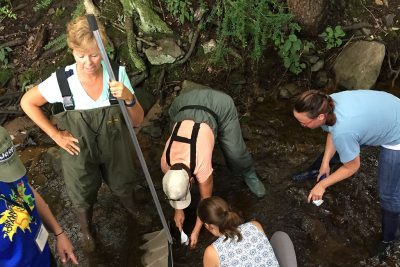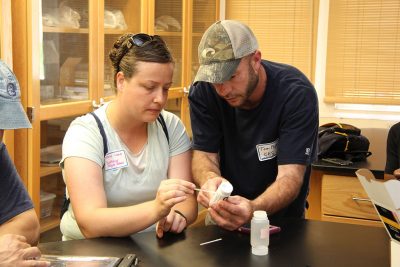
Editor’s Note: The following piece was originally published by the UConn Extension at the College of Agriculture, Health, and Natural Resources, in its Highlights of Extension report. Insights from Neag School faculty David Moss and Todd Campbell have been incorporated. Access the original PDF of this piece via Google Drive.
UConn Extension is leading a project that provides high school science teachers from across the state with a head start on a new way of teaching. Over the past two summers, 48 teachers from 38 school districts attended the three-day Teacher Professional Learning (TPL) workshop, Land and Water.
The training, funded by a U.S. Department of Agriculture/National Institute on Food and Agriculture (USDA/NIFA) grant, was developed and is taught by Extension faculty from the Center for Land Use Education and Research (CLEAR) and partners from the Department of Natural Resources and the Environment; the Center for Environmental Sciences and Engineering; and the Neag School of Education. This formidable partnership conducts three interrelated STEM projects collectively known as the Natural Resources Conservation Academy (NRCA) (see sidebar).
“This real-world collaborative project aims to ensure secondary science educators are well positioned to meet the rigorous instructional demands of today’s classrooms.”
— David Moss, Associate Professor and Co-Principal Investigator
Connecticut is one of 19 states to date that have adopted the Next Generation Science Standards (NGSS), an ambitious new way of teaching science that was developed by a consortium of states and nonprofit science organizations, including the National Science Teachers Association, the American Association for the Advancement of Science, and the National Research Council. Connecticut school districts are still in the very early stages of adopting NGSS methodologies, and many teachers are eager for educational units and techniques that fit NGSS standards.
STEM Education for Teens, Adults, and TeachersThe Natural Resources Conservation Academy (NRCA) is a group of three linked projects that focus on connecting STEM education for high school students with natural resource conservation at the local level.
With more than 130 land trusts in the state and each of its 169 municipalities having a Conservation Commission, Connecticut has a long history of local conservation. NRCA provides an assist to these efforts, while educating students and teachers about the science and issues surrounding natural resource protection.
The TPL is joined by the foundational NRCA project, the Conservation Ambassador Program (CAP), and the Conservation Training Partnership (CTP). CAP brings high school students from around the state to campus for a weeklong intensive field experience at the UConn main campus, from which they return home to partner with a community organization on a conservation project of their own design. CTP moves around the state for two-day training of adult-student teams that teaches them about smart phone mapping applications and their use in conservation. The teams then return and implement a conservation project. Together, the three programs have educated 308 participants and resulted in 187 local conservation projects in 105 towns, involving 119 community partner organizations. — Chet Arnold |
The main focus of the UConn workshop is the relationship of land use to water resource health, and the use of online mapping and other geospatial tools to help explore these relationships — particular strengths of the CLEAR team. The UConn campus and surrounding area provide an ideal outdoor laboratory to explore these concepts. Attendees sample three streams within about a mile of campus, all with very different characteristics based on the predominant land use of their respective watersheds — agriculture, urban, and forest. They then come back to the classroom, study their results, and compare notes to get a sense of the importance of land use in determining the health of a water body. Also used in the instruction is the campus itself, which has become a showcase of low-impact development (LID) practices designed to reduce the impact of stormwater runoff on local streams. After learning about LID and touring the green roofs, rain gardens, and pervious pavements across campus, the participants visit a nearby campus building and devise their own plan for LID installation. The workshop also introduces them to online mapping and watershed analysis tools that enable them to focus in on their own town, watershed, or even high school campus, thus using their community waterways as a teaching tool.
“The challenge of preparing teachers for the Next Generation Science Standards is significant, and this real-world collaborative project aims to ensure secondary science educators are well positioned to meet the rigorous instructional demands of today’s classrooms,” says David Moss, associate professor in the Neag School and co-principal investigator on the project. “Partnering with key stakeholders across the University, the Neag School is pleased to offer our expertise in science curriculum, assessment, and instruction.”
“The exciting thing about collaborating with colleagues from CLEAR, the Department of Natural Resources and the Environment, and the Center for Environmental Sciences and Engineering to lead this project lies in the collective expertise that is leveraged from across campus to support teachers and students in concurrently learning about and participating in the use of sustaining environmental practices in ways that can meet local community pursuits,” adds Todd Campbell, professor in the Neag School and also a co-principal investigator.

Teachers leave the training with a wide variety of resources to help them in the classroom, not the least of which is their personal experience working through these topics with the Extension instructional team. In addition, the Neag School members of the team have developed a 25-unit lesson plan that follows the educational progression of the workshop; teachers are encouraged to adapt all or part of the lesson plan for their use.
Of the latest (Summer 2018) class of 25 teachers, 100% said that the training was relevant to their classroom instruction, that the training was time well-invested, and that they would recommend the training to other teachers. Research is ongoing on how many teachers implemented all or part of the curriculum, and how it played out with their students. Although the project plan was for two workshops, they have been so well received that the team is holding a third TPL training in this summer and is looking for resources that would enable them to continue this program for the foreseeable future.
 Facebook
Facebook
 Twitter
Twitter
 LinkedIn
LinkedIn
